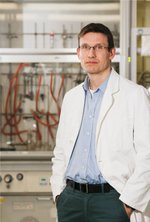
Chemistry
The Faculty of Chemistry has around 1600 students divided in roughly equal numbers between its three degree programmes in Chemistry, Water Science, and Teaching and is one of the largest faculties of its kind nationwide. The majority of professors have been appointed to the University of Duisburg-Essen only in the past few years. This transition to a new generation of professors was completed in 2014.
At the present time, 24 professors and three independent early stage research groups (one of which is a Junior Professorship) teach and research in the following disciplines: Inorganic Chemistry, Organic Chemistry, Physical Chemistry, Technical Chemistry, Analytical Chemistry, the Biofilm Centre, Didactics of Chemistry, and Theoretical Chemistry. Every year, some 40 to 50 young scientists complete their doctorates with us, not only from Chemistry but on account of our interdisciplinary research also from Physics, Biology and Engineering.
The many new colleagues who have joined us in the course of the past few years have helped to create many new and predominantly interdisciplinary research projects. Since the majority of these projects are externally funded, the Faculty’s income from external funding has roughly tripled in the last five years to its present total of just under seven million euros. The Faculty of Chemistry was involved in numerous coordinated national research programmes in 2013 and 2014 (including two Collaborative Research Centres, a Transregio-SFB with China, two Research Units, three DFG Priority Programmes, two Research Training Groups and two Excellence Clusters). Four of these collaborations are led and coordinated by our Faculty. The Faculty of Chemistry is similarly coordinating several EU projects in their entirety or in part. Added to these are numerous BMBF, AiF, Volkswagen, industry and in particular DFG projects as individual grants.
The entire scope of chemistry research – from pure research to work of a more applied nature – is represented at the Faculty. Our research is highly interdisciplinary and can be divided into four major thematic areas: Supramolecular Chemistry with a biological and material science focus, Nanosciences, Water and Environmental Research, and Empirical Educational Research. Our scientists cooperate closely in these areas with our neighbouring Faculties of Biology, Physics, Engineering and Medicine. The Faculty also has two affiliated institutes, the Deutsche Textilforschungszentrum Nordwest (German Textile Research Centre North-West, DTNW) in Krefeld and the Rhenish-Westphalian Institute for Water Research (IWW) in Mülheim, both of which conduct practical, applied research.

